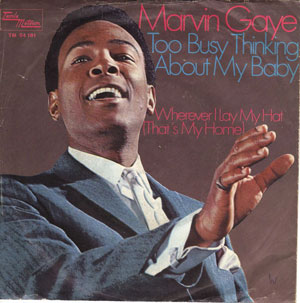
"Too Busy Thinking About My Baby" is a Motown song written by Norman Whitfield, Barrett Strong, and Janie Bradford. The song was first recorded by The Temptations as a track on their 1966 album Gettin' Ready. Eddie Kendricks sings lead on the recording, which was produced by Whitfield. Jimmy Ruffin also recorded a version with The Temptations providing background vocals in 1966. It remained unreleased until 1997.

"Until You Come Back to Me (That's What I'm Gonna Do)" is a song written by Morris Broadnax, Clarence Paul, and Stevie Wonder. The song was originally recorded by Stevie Wonder in 1967, but his version was not released as a single and did not appear on an album until 1977's anthology Looking Back. The best-known version of this song is the 1973 release by Aretha Franklin, who had a million-selling top 10 hit on Billboard charts. The song reached No. 1 on the R&B chart and No. 3 on the Hot 100 chart in 1974. It became an RIAA Gold record.

"Summer Breeze" is a 1972 song by American soft rock duo Seals and Crofts. It is the title track of their fourth studio album, and was released as the album's lead single in August 1972. The song reached No. 6 on the US Billboard Hot 100 chart in the US. In 2013, it was ranked No. 13 in Rolling Stone′s "Best Summer Songs of All Time". The song also became a hit for the Isley Brothers in 1974.

"Montego Bay" is a song co-written and performed by Bobby Bloom about the city in Jamaica of the same name. The song was a top ten hit for Bloom in the Fall of 1970 on both sides of the Atlantic. It reached No. 3 on the UK Singles Chart, No. 5 on the Canadian RPM 100 Singles Chart, No. 7 on the Australian Go-Set Singles Chart and No. 8 on the US Billboard Hot 100. The song was co-written and produced by Jeff Barry. In the master tape of the song, Bloom breaks into a chorus of "Oh, What a Beautiful Mornin'" at the end of the recording. The song features a whistler, as well as Jamaican instruments in a calypso style.
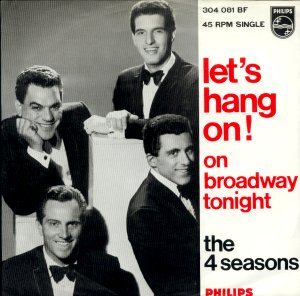
"Let's Hang On!" is a song composed by Bob Crewe, Sandy Linzer, and Denny Randell that was popularized by the Four Seasons in 1965.

"Tell It to the Rain" is a song composed by Mike Petrillo and Chubby Cifelli and popularized by The Four Seasons in 1966 and early 1967. The single reached the #10 position on the Billboard Hot 100 singles chart.

"I Believe You" is a love ballad composed by Don and Dick Addrisi which was a 1977 single for Dorothy Moore; taken from her self-titled Dorothy Moore album. "I Believe You" reached #5 R&B and crossed over to the US Pop Top 30 at number 27. The track also reached number 20 in the UK.

"Somethin' 'Bout You Baby I Like" is a popular song written by guitarist Richard Supa in the early 1970s. The version by Tom Jones reached No. 36 in the UK in 1974. Glen Campbell and Rita Coolidge reached No. 42 in the US with their recording of the song in 1980.
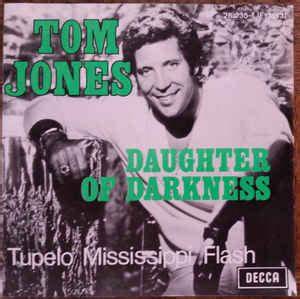
"Daughter of Darkness" is a single by Tom Jones released in 1970 from his album, I Who Have Nothing. It was a top ten hit in the UK, peaking at No.5. In the United States and Canada, Jones just missed the top ten with "Daughter of Darkness", peaking at No.13 and No.11, respectively. The song went to No.1 in the United States on the Billboard Easy Listening chart in June 1970, and was Tom Jones' final of three number ones on the chart. Elton John, who was working as a session musician at that time, also sang on the recording.

"What Cha Gonna Do with My Lovin'" is a song by American singer and songwriter Stephanie Mills, released in July 1979 as the first single from the album of the same name (1979). It became a hit, reaching No. 22 on the US Billboard Hot 100. It was also a top 10 hit on the Billboard R&B chart, as well as a minor hit in Canada.

"Next Door to an Angel" is a rock and pop song written by Neil Sedaka and Howard Greenfield and recorded by Neil Sedaka in 1962. It was issued by RCA Victor Records. It reached No. 5 on the Billboard Hot 100 in late 1962. "Next Door to an Angel" also went to No. 19 on the Hot R&B Singles chart. It was Sedaka's last appearance on the American Top 10 until "Laughter in the Rain" in late 1974.
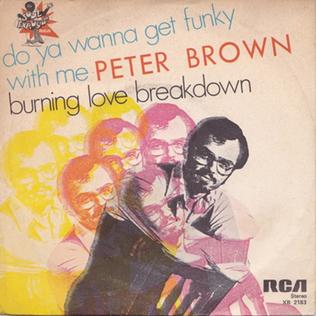
"Do Ya Wanna Get Funky with Me" is a 1977 single recorded by Peter Brown. The record sold more than one million copies. It was his first hit song. Backing vocals were provided by Wildflower.
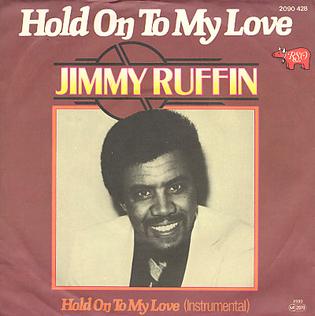
"Hold On (To My Love)" is a song written by Robin Gibb and Blue Weaver and performed by American soul singer Jimmy Ruffin, released in 1980 on his album Sunrise. It reached #10 in the US, #29 R&B and #7 in the UK.

"Let Me In" is a song written by Alan Osmond, Merrill Osmond, and Wayne Osmond and performed by The Osmonds. It was featured on their 1973 album, The Plan. The song was produced by Alan Osmond.

"Stay Awhile" is a song originally recorded by Dusty Springfield in 1964. It was the second single from her LP, Stay Awhile/I Only Want to Be with You. It became a top 20 hit in the United Kingdom, and reached the top 40 in Australia and the U.S.

"Reelin' and Rockin'" is a song written and recorded by Chuck Berry. It was originally recorded in 1957 and released as the B-side of "Sweet Little Sixteen".
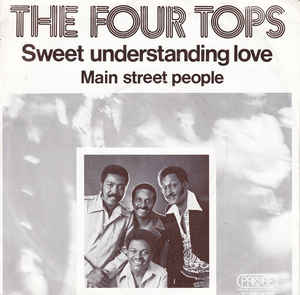
"Sweet Understanding Love" is a 1973 hit song recorded by the Four Tops for the ABC Records label. The song was the second of three single releases from their sixteenth studio album, Main Street People. The title track of the LP is on the B-side of the 45. "Sweet Understanding Love" was placed on their 1991 compilation album Ain't No Woman . It was also included on their album Anthology: 50th Anniversary (2004).

"Weekend" is a song written by English singer-songwriter Mick Jackson and Tommy Mayer, and released in 1978 on Jackson's Weekend album. It was then covered in 1979 by the American group Wet Willie where it peaked at number 29 on the U.S. Billboard Hot 100 during the summer of the year. Jackson's version charted in the United Kingdom, reaching #38.

"Guilty" is a 1974 song by British vocal duo The Pearls. It was the group's final charting single in the UK.
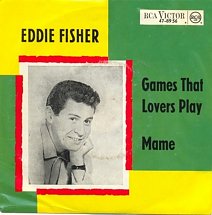
"Games That Lovers Play" is a popular song composed by James Last which became a hit for multiple artists in 1966 and 1967. The song has been recorded more than 100 times.


















